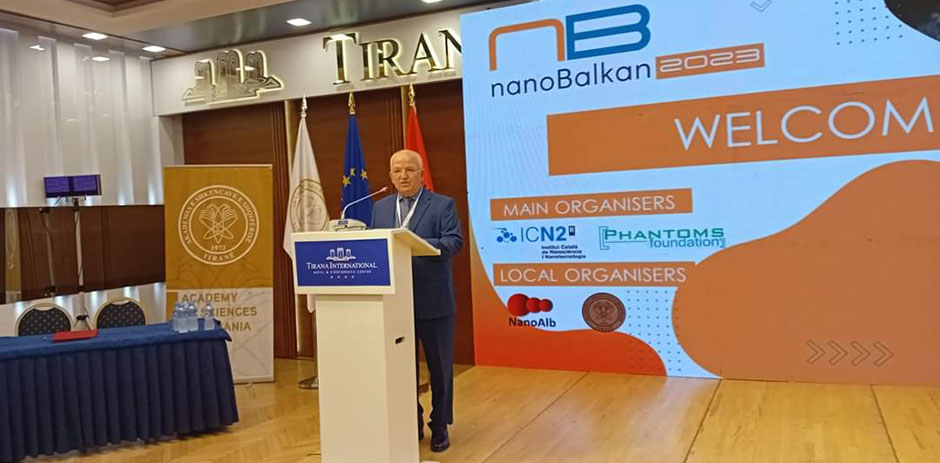The ICN2 significantly contributed to the success of the nanoBalkan Conference, co-organising numerous events and showcasing advancements in nanobiosensors technologies. ICREA Prof. Arben Merkoçi led the ICN2 delegation, with notable participation from ICN2 researchers and Nobel Laureate Kostya Novoselov, fostering a robust scientific dialogue and international collaborations.

The recent nanoBalkan Conference (October 16-20, Tirana, Albania) emerged as a remarkable platform for engagement and discussion on nanotechnology and biosensors. Under the guidance of ICREA Prof. Arben Merkoçi, Group Leader of the ICN2 Nanobioelectronics and Biosensors Group, ICN2 played a pivotal role as a co-organiser, coordinating various satellite workshops and trilateral meetings with Japan and Italy, which fostered international collaborations. In the Spain-Italy-Albania workshop “Clinicians Meet Nanotechnologists”, prominent researchers and professors met to discuss how to tighten up the interactions between these important sectors and countries. In the Spain-Japan-Albania workshop “Nanotechnologies for the 21st Century,” scientists and representatives from institutions of the three countries shared ideas in the field of Nanoscience and Nanotechnologies and their applications in important areas such as life sciences, information technologies, and energy. Both trilateral meetings were organized and coordinated by ICN2.
ICREA Prof. Stephan Roche, Group Leader of the ICN2 Theoretical and Computational Nanoscience Group, alongside researchers Marc González Cuxart and Juan Sierra, represented ICN2’s profound commitment to the field. They shared their expertise and showcased the innovative strides being made in nanotechnology. A high-profile workshop, organized by the European project SUSNANO, aimed at advancing environmental sensor research, took place during a recent congress in Tirana. Renowned researchers presented groundbreaking work on paper sensors, 3D printing of 2D materials, carbon nanosensors, CRISPR, aptasensors, and other related fields. Their participation not only facilitated possible collaborations with the SUSNANO project but also inspired future environmental research efforts. Furthermore, graduate students had an exceptional opportunity to present their doctoral and master's research, participating in open discussions and sharing ideas with expert researchers in a relaxed and collaborative setting during the workshop.
Adding a layer of prestige to the conference was the participation of Nobel Laureate Kostya Novoselov. His insights and engagement with the attendees enriched the conference deliberations, underlining the global significance of the discussions and the potential impact of the collaborations being fostered through this platform. Also, a one-day session was dedicated to Prof. Joseph Wang for his 75th anniversary, inviting former students, postdocs, and collaborators to share their expertise on nanomotors, wearable nanosensors, and their memories on Joe Wang’s laboratories.
It must also be highlighted that the Nanobiosensors School, which was coordinated by ICN2 researcher Daniel Quesada-González. The session aimed to provide an overview on different topics related to biosensors and nanotechnology, with an educational purpose so that any attendee could learn the basics on new techniques and technologies. The School covered a range of topics including nanoscale transducers, paper-based sensors, biorobotics, portable readings platforms, and the potential of molecular sensing.
The conference featured an extensive programme, including a special School of Nanobiosensors and discussions on artificial intelligence in nanotechnology. The dialogue generated during these sessions underscored the vibrant international partnerships and the collective stride towards addressing complex challenges inherent in nanotechnology and biosensor fields.
Prof. Merkoçi expressed satisfaction with the outcome of the conference and the proactive role ICN2 played in both organising and contributing to the scientific dialogue. The nanoBalkan conference not only showcased the progress being made in nanotechnology but also highlighted the importance of international collaborations in propelling the field forward.
The success of ICN2's involvement in the nanoBalkan Conference, coordinated by Phantoms Foundation with Academy of Sciences of Albania as local organizer, exemplifies the institute's dedication to being a catalyst for innovation and international collaboration in the rapidly evolving domain of nanotechnology.

